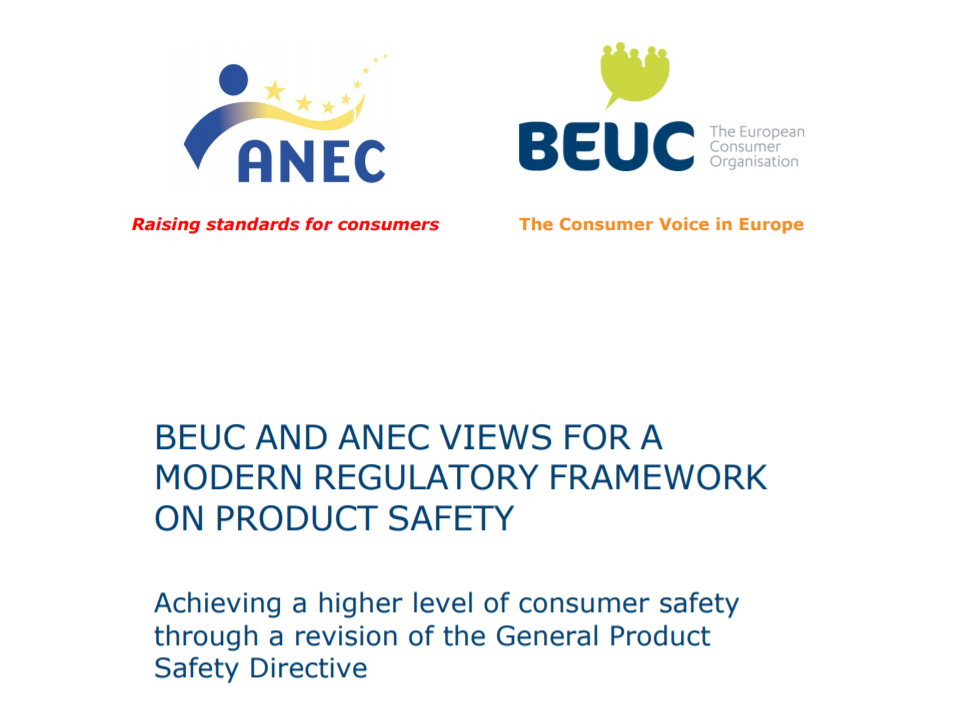Horizontal
ANEC comments on draft AUWP 2021
At the invitation of the European Commission (EC), we have commented on the draft Annual Union Work Programme for European Standardisation for 2021 (AUWP).
The scope of our comments includes inclusiveness and international cooperation, as well as specific projects and ecosystems for recovery from the COVID-19 pandemic.
The commentary can be found at https://bit.ly/2QlB5ra.

ANEC/BEUC comment on revision of GPSD
Ahead of the expected revision of the General Product Safety Directive (2001/95/EC), we and BEUC have published a position paper on how the revision should contribute to higher levels of consumer protection in the EU. The paper can be found at https://bit.ly/32up0Wj.
The GPSD has proved a fundamental piece of consumer protection legislation. It established the obligation on producers to place only safe products on the market, beyond the product-specific legislation of the New Approach. In practice, this means the GPSD is the main safety law for commodities as diverse as furniture, textiles and child-care products. But by 2020, it has become outdated, having been adopted in 2001.
In summary, we believe the revision should take place within the following framework:
- Keeping the GPSD as a horizontal safety net which can fill gaps in sector specific legislation, based on the precautionary principle.
- Establishing a uniform framework for market surveillance of all consumer products with flawless traceability along the supply chain and effective enforcement.
- Making the GPSD future proof to cope with new technologies.
- Ensuring accountability in the supply chain and closing loopholes regarding international e-commerce.
- Reducing the exposure of consumers to harmful chemicals in products.
- Setting product-specific mandatory safety requirements to provide legal certainty.
- Allowing the legislator to choose more rigorous conformity assessment methods; defining criteria for child-appealing products; improving the effectiveness of product recalls, and collecting EU-wide accident and injury data.
- Working well and smoothly with other policy reforms such as the Product Liability Directive, the Digital Services Act and the sustainable product policy initiative.
ANEC position on the new EU Consumer Agenda
ANEC wants a new vision for the role of consumers and consumer policy in Europe, one that integrates all policies which can affect the consumer interest. We believe this to be crucial, as our activities span key areas that fall outside what is considered to be usual for consumer policy. In our position paper, we recall that, beyond general product safety, standards are used as a tool for consumer protection in legislation on specific product safety, accessibility, the environment, services & ICT. Our position can be found at https://bit.ly/32o91sQ.

Accessibility
CEN Enquiry on EN 81-70
The Enquiry of the ‘editorial’ revision of EN 81-70 on accessibility of lifts closed with a postive outcome in August. All 20 national members voting approved the revision.
The revision of EN 81-70 started in 2019 to address editorial comments from the EC on the drafting of Harmonised Standards. These comments concerned several other Harmonised Standards on lifts (and other products such as mobile phones and medical devices).
Given ANEC had appealed against the standard, we were not able to support the approval of the standard, despite it being only an editorial revision. Our comments revolved around the technical aspects of the standard, specifically regarding the colour contrast of lift buttons and how it is measured. Several countries also commented on technical aspects, including highlighting accessibility gaps in the standard and making proposals for improvment.
Domestic Appliances
‘Misuse of a BBQ grill can kill’
In July, we supported EC DG JUST’s summer campaign on the safe use of barbecue grills (https://bit.ly/2QQWfxT).

Photo credit: European Commission
The campaign was based on a previous carbon monoxide campaign by ANEC, in partnership with Consumer Safety International (CSI), to raise awareness that portable and disposable charcoal barbecues can be dangerous when not used under the correct conditions.
During the summer, many consumers go camping and use barbecue grills. Some take the barbecue inside or indoors to heat the tent or caravan, or to cook in case of rain. However, the use of charcoal barbecue grills indoors creates an accumulation of poisonous carbon monoxide, a gas which can kill. Even when cooling or smouldering, charcoal barbecues emit large volumes of carbon monoxide.
Find out more about carbon monoxide in the material at https://bit.ly/2RqF0n7.
Sustainability
ANEC comments on reducing packaging waste
In July, we commented on the EC Roadmap for the review of packaging rules and measures to reduce packaging waste. See https://bit.ly/3huL2xR.
We welcome the initiative, as the current "essential requirements" of the Packaging Directive are vague and do not give clear instructions to business on how to reduce, reuse and recycle packaging, thus constraining its enforcement.
We trust the revision of the packaging rules will allow for the development of detailed legal requirements for packaging. Our paper summarises recommendations on how to address the crucial objectives in this area.
Prevention needs to be top priority. We recommend establishing reduction goals for single use packaging; setting clear-cut and enforceable rules for prevention of excessive packaging and banning specific forms of packaging. Moreover, we believe it essential to prevent use of hazardous chemicals both to protect the consumer and prevent impediments to recycling.
We want systematic expansion of reuse systems at the expense of single use packaging, wherever possible and useful. To achieve that, we suggest product-specific reuse targets; a ban on corresponding single-use product systems; and standardising the shapes and other features of reuse containers, alongside tax incentives.
Finally, we ask that recycling is promoted only when contamination arising from problematic chemicals can be excluded. We explain how.

ANEC comments on proposal to substantiate green claims
We have commented on the Roadmap for the impact assessment regarding the legislative proposal on substantiating green claims, announced in the Green Deal.
We believe the intention of the Green Deal to tackle misleading green claims is laudable, as well as the recognition that consumers need reliable, comparable and verifiable information on environmental performance of products and services. In our paper, we explain why we disagree that the substantiation of claims is done using the PEF/OEF method, as the options identified in the Roadmap suggest. We urge a different approach is taken, with a regulation that could specify conditions of use of certain claims.
Such regulation could specify in detail the conditions and binding requirements for use of specific terms, based on the principles of ISO 14020 ‘Environmental labels and declarations — General principles’. This would also include requirements for evaluation of environmental claims. Any verification would be based on a relevant test procedure (e.g. chemical analysis) or other appropriate conformity assessment procedure (e.g. to trace origin of bio products).
Most green claims we see are not based on lifecycle considerations, and different methods have different strengths and weaknesses when characterising environmental performance of products. These need to be combined in a cost-efficient manner.
Our assessment reflects our research and critique of the LCA and Product Environmental Footprint methods, and their use in characterising and communicating the environmental performance of products and activities.

Digital Society
New ANEC AHG on cybersecurity
We have just launched a new ANEC ad hoc group on consumer cybersecurity requirements for product standards in non-digital areas. The AHG has been created with the aim to draft cybersecurity requirements based on the DIN Consumer Council study “Digitization aspects & consumer requirements with regard to ‘smart’ toys - Implementation in standardization”. The study (in German) can be found at https://bit.ly/32sout9.
The AHG will also discuss and agree on the strategy for such requirements to be included in standards, in the absence of clear legal cybersecurity requirements applicable to consumer products. The strategy will take into account the on-going work under the Radio Equipment Directive, CEN-CLC JTC13 on cybersecurity, ETSI TC CYBER, which just published ETSI EN 303 645 Cyber Security for Consumer Internet of Things: Baseline Requirements, including the future activities under the European Cybersecurity Act.

EC HLEG AI on-line tool
On 17 July, the EC welcomed the Assessment List for Trustworthy AI (ALTAI), a check list for business & organisations to self-assess the trustworthiness of their artificial intelligence (AI) systems under development. This will further strengthen the benefits that AI yields to the economy and society. The ALTAI portal can be found at https://bit.ly/32tPHeU.
The concept of Trustworthy AI, introduced by the High-Level Expert Group on AI (AI HLEG), of which ANEC is a member, is based on seven key requirements:
- human agency and oversight,
- technical robustness and safety,
- privacy and data governance,
- transparency,
- diversity, non-discrimination and fairness,
- environmental and societal well-being and,
- accountability.
ALTAI is the first instrument that translates AI principles into an accessible and dynamic checklist which developers and deployers of AI can use. ALTAI will help to ensure that users benefit from AI without being exposed to unnecessary risks. The Assessment List has been revised following a piloting process that involved more than 350 stakeholders. It is available in a document version and as a prototype of a web-based tool.

Traffic & Mobility
Roadmap on Sustainable & Smart Mobility
The EC intends to adopt a comprehensive strategy to ensure the EU transport sector is fit for a clean, digital and modern economy. In July, we commented on the Roadmap released as part of this action. Please see https://bit.ly/2Rsod2Y.
We believe the EU urgently requires a new framework to work towards reduced emissions (zero emissions) and support development of infrastructure for smart mobility on European roads. Automated and electric mobility presents a diverse range of new opportunities for consumers. These systems will have significant impacts on personal mobility services, not only for vulnerable citizens or the older people but for all consumers. Smart vehicles play a vital role in this context.

| List of meetings 2020 |
For comments or if you wish to write an article for the ANEC Newsletter, please contact: Marijana ANTAROROVA (This email address is being protected from spambots. You need JavaScript enabled to view it.).



